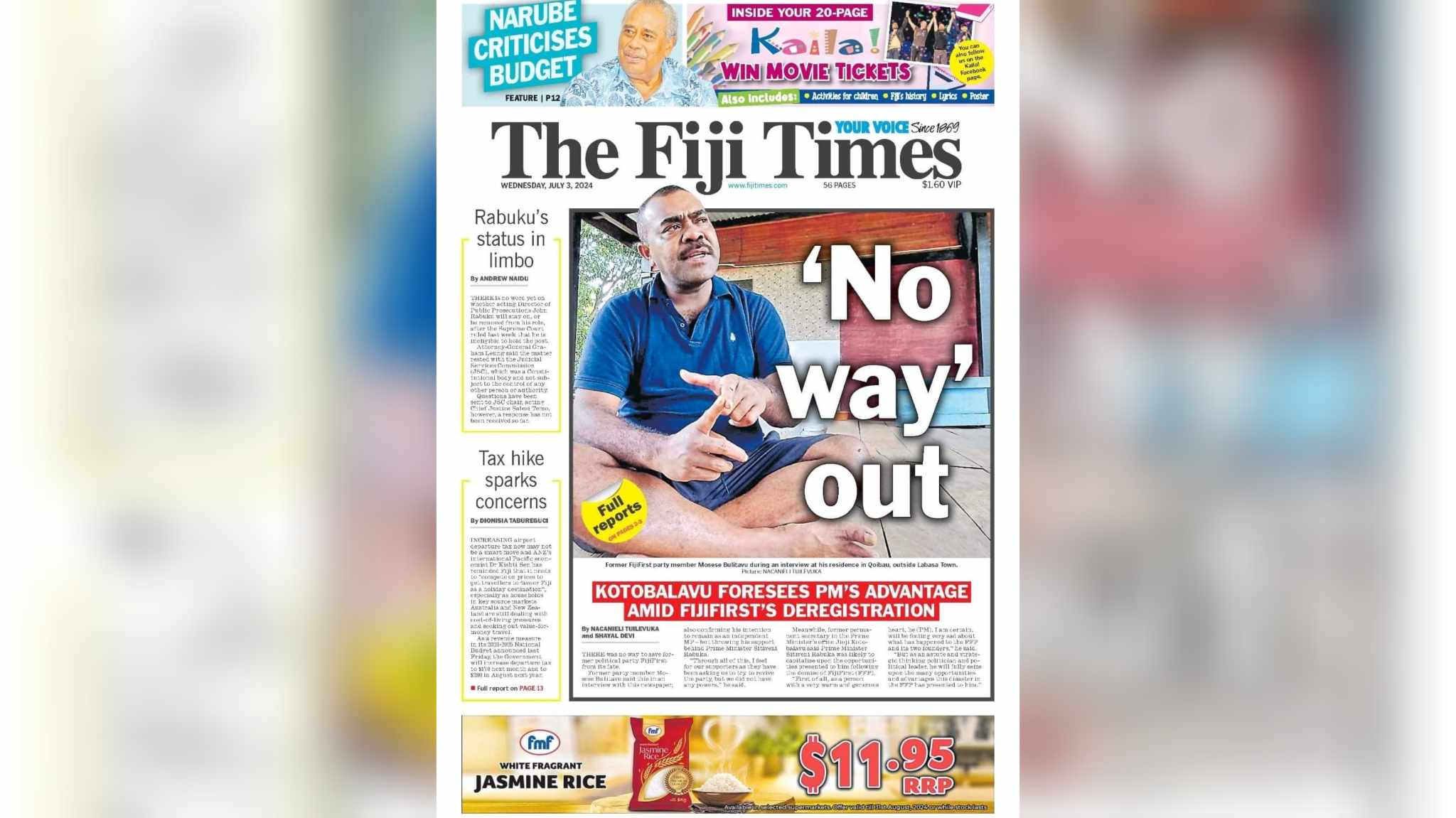Bula
There was no way to save former political party FijiFirst from its doomed fate. Member of Parliament Mosese Bulitavu said this in an interview with this newspaper, also confirming his intention to remain as an independent MP – but throwing his support behind Prime Minister Sitiveni Rabuka. Meanwhile, former permanent secretary in the Prime Minister’s office Jioji Kotobalavu said Prime Minister Sitiveni Rabuka was likely to capitalise upon the opportunities presented to him following the demise of FijiFirst (FFP). That’s the big news on the front page of The Fiji Times for Wednesday, July 3.
In another story, there is no word yet on whether acting Director of Public Prosecutions John Rabuku will stay on, or be removed from his role, after the Supreme Court ruled last week that he is ineligible to hold the post. Attorney-General Graham Leung said the matter rested with the Judicial Services Commission (JSC), which was a Constitutional body and not subject to the control of any other person or authority. Questions have been sent to JSC chair, acting Chief Justice Salesi Temo, however, a response has not been received so far.
Synopsis
The revelation by ANZ’s international Pacific economist Dr Kishti Sen that increasing departure tax may backfire on Fiji as competing destinations win travellers on price, should attract attention.
Dr Sen reckons it could leave Fiji with a costly reputation.
The stimulus provided by affluent travelers and Australians who had built savings buffers during the pandemic and had kept Fiji’s tourist demand up post-COVID, he warned, was now fading.
It seems Australians are now returning to their preferred destinations in South-East Asia and the cash savings ratio in Australia has returned to the pre-pandemic levels of about 14 per cent.
So now we have what appears to be a scenario where Fiji’s tourist numbers from New Zealand, our second biggest source market, is also “tapering off” and at a “slightly higher level” than the Australians.
Dr Sen is right, “Tourism is very price sensitive”.
So, it makes sense that we must compete on prices if we want tourists to keep coming back here, or choose Fiji as a preferred holiday destination.
This is why, he reckons, “increasing departure tax makes it a little harder to compete on value for money proposition when competition is red hot”.
In saying that, just a month ago, in May, the revelation that Fiji was on track to welcome a million visitors to our shores this year was welcomed with great enthusiasm.
Acting Prime Minister and Minister for Civil Aviation and Tourism Viliame Gavoka made this known at the Fiji Tourism Exchange (FTE).
He said it opened up numerous opportunities.
He spoke about “our brand message, ‘Where happiness comes naturally’”.
It was designed to takes Fiji’s “authentic beauty culture and experiences to the world from cities like Sydney and Beijing to Times Square and everywhere in between”.
Fiji received a record 929,740 visitors, with almost 80 per cent visiting for a holiday.
Our key source markets have remained Australia and New Zealand with significant growth coming from North America.
The visitor economy contributed over $3billion in revenue during the year, highlighting the significant economic impact of tourism on Fiji.
In saying that, we reflect on this departure tax issue and wonder how that will impact our figures moving forward.
The tax goes up to $170 next month and to $200 on August 1 next year.
The increase, announced in last week’s 2024-2025 National Budget, is being justified as timely by the Government, which suggests the industry is doing so well it can afford it.
The industry, Minister of Finance Professor Biman Prasad insists, has rebounded very strongly.
“Hoteliers and players in the tourism industry have done very well. Some of them have also made windfall profits. And that has had a positive impact on the economy through spending in other sectors,” he said.
“We don’t see demand as a problem. We see supply as a problem. Accommodation, more rooms…so we’re taking (departure tax) back to $200.
The increase is projected to contribute $46.4million in additional revenue this year.
For whatever it is worth, we look up to the powers that be to ensure processes and changes are made taking into consideration our needs as a country, and are embracing of positive growth.



